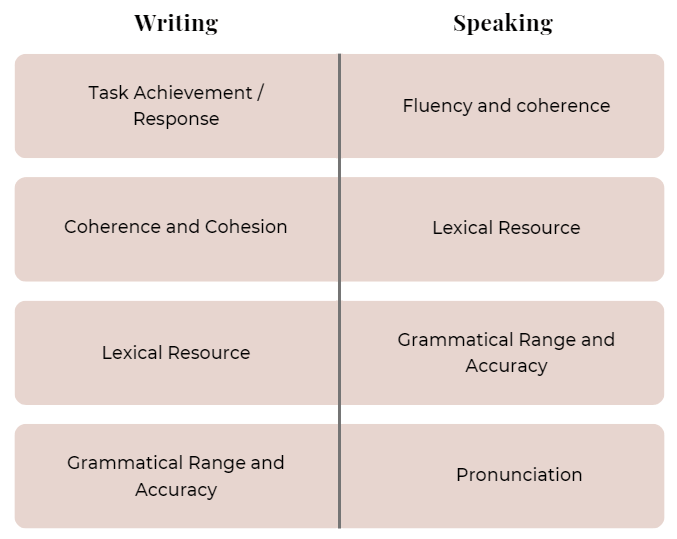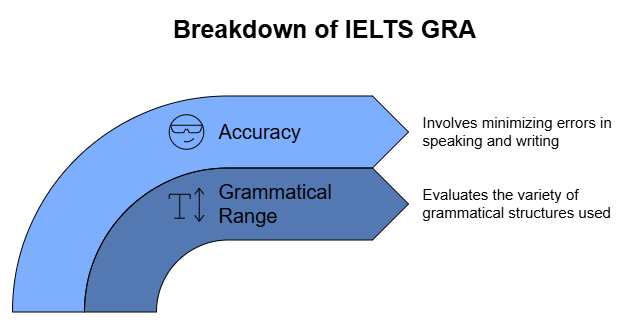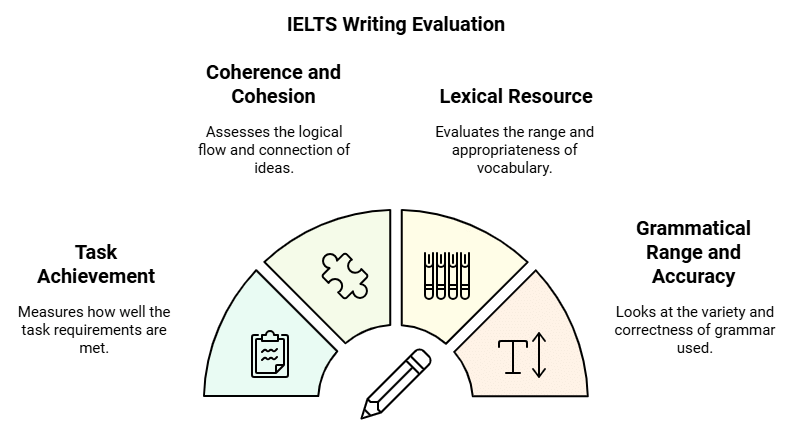Why is Grammar Important in IELTS Test? | Basic Grammar for IELTS PDF Download
Excellent grammar significantly impacts your overall IELTS band score. While it might seem that the exam doesn't directly assess grammar, it plays a crucial role in achieving the desired band score. Grammar serves as the foundation of any language, including English, Hindi, Punjabi, and more. To excel in all four tested skills in the IELTS exam—Listening, Reading, Writing, and Speaking—it's essential to have a solid understanding of English grammar.
These are specifically what you are graded on in each test:

- So as you can see, grammar makes up 25% of each test.
However, it is also important for the 'lexical resource' part. This is your use of such things as your vocabulary, idiomatic vocabulary, and collocations. - You will be marked down on this if you are making mistakes with such things as word forms (e.g. using a noun form instead of a verb form) so this is also grammar-related.
- This is not to suggest that you should focus only on grammar as the other elements such as fluency in your speaking and your ability to answer the question and organise your response in the writing are a major part of the marking.
- But it is important to work on improving your IELTS grammar, and this is often the part candidates have the most problems with and the thing that brings their score down.
IELTS GRA
IELTS GRA, which stands for Grammatical Range and Accuracy, comprises two essential components:

- Grammatical Range: The Grammatical Range aspect in IELTS evaluates the quantity or number of criteria assessed in the writing test.
In the IELTS Speaking band descriptors, the components considered are:
- Grammatical Range and Accuracy
- Pronunciation
- Fluency and Coherence
- Lexical Resource
For IELTS Writing (Task 1 and Task 2), the range of grammar is assessed in the following areas
- Task Achievement/ResponseCoherence and Cohesion
- Grammatical Range and Accuracy
- Lexical Resource
These factors apply to both Writing Task 1 and Task 2. - Accuracy: Accuracy in the IELTS speaking and writing sections involves avoiding errors.
The candidate's band score is directly influenced by the presence or absence of recurring errors they make. Test-takers must strive for error-free performance to achieve their desired band score.
Importance of Grammar in IELTS Writing
- The IELTS writing section is acknowledged as the most challenging part of the exam, demanding a strong command and in-depth knowledge of English grammar.
- Grammatical errors in IELTS writing result in deductions, unlike the speaking exam where the consequences are less severe.
- Even minute punctuation symbols, such as commas, exclamation signs, periods, and semi-colons, are meticulously evaluated, as these are not typically used in spoken English.
- Therefore, careful attention to punctuation is crucial in IELTS writing.
For example:
Sentence 1: Let’s eat Dad.
Sentence 2: Let’s eat, Dad.
The addition of a comma in the second sentence significantly alters the meaning of both sentences.

In the IELTS writing evaluation, candidates are assessed on:
- Task Achievement
- Coherence and Cohesion
- Lexical Resource
- Grammatical Range and Accuracy
When undertaking the IELTS writing exam, candidates should be confident in their sentence construction. It is advisable to familiarize oneself with various sentence types in English grammar, avoid excessive clauses, and incorporate short, precise sentences with accurate pauses.
Importance of Grammar in IELTS Speaking
Similar to the IELTS writing examination, the IELTS speaking test is evaluated based on four key criteria:
- Fluency and Coherence
- Lexical Resource (Vocabulary)
- Grammatical Range and Accuracy
- Pronunciation
A significant portion, approximately 25%, of the IELTS speaking score is attributed to the correct use of grammar. Achieving fluency in English with accurate grammar is crucial for obtaining the desired band score in the IELTS speaking exam.
Now, examining Grammatical Range and Accuracy in IELTS speaking:
A candidate scoring Band 7 can skillfully generate a blend of simple and complex sentences, albeit with some acceptable grammatical errors. Conversely, candidates attaining Band 5 employ simpler sentences and often exhibit common grammatical mistakes. This emphasizes the pivotal role of grammar in determining IELTS speaking performance.
Importance of English Grammar in IELTS Reading
- In the IELTS reading section, comprehension of questions is essential to extract information from the text effectively. To achieve this, a solid understanding of English grammar is necessary, particularly in distinguishing between tenses and grasping sentence meanings.
- Consider this example:
Original: After staying in numerous hotels for a few months, Harry was exhausted and made the decision to return home to Germany.
Revised: After staying in numerous hotels for a few months, Harry was getting exhausted and would soon make the decision to return home to Germany.
Although the difference between the two sentences is minor, it could impact the answer to a question related to the timing of Harry's decision to go home. In the first sentence, Harry has already felt exhausted and made his decision, while in the second sentence, Harry is beginning to feel exhausted and will soon decide to go home. - While grammar may not be as central in the Listening and Reading sections, a proper understanding is still necessary to accurately select the right answers in the IELTS reading test by interpreting sentence nuances correctly.
Importance of English Grammar in IELTS Listening
- In the IELTS listening module, grammar holds a relatively lower significance compared to the other three modules. Nevertheless, it cannot be entirely disregarded, as a sound understanding of grammatical structures is essential for comprehending spoken sentences in the IELTS listening audio.
- For instance, consider the sentences:
Original: Today we’re going to talk about the weather in Australia.
Paraphrased: Today we’ve been talking about the weather in Australia. - Although the distinction between these sentences is subtle, it carries a significant impact on the overall sense or meaning. This emphasizes that while IELTS listening may place less emphasis on grammar, it remains crucial for obtaining accurate answers and should not be overlooked.
Grammar Rules to Enhance Your IELTS Performance
1. The Simple Aspect:
- Essential for all candidates in the IELTS speaking test.
- Choose appropriate verb tense and aspect.
- Differentiate between simple and continuous verb tenses.
2. Present Perfect and Simple Past Verb Tenses:
- Crucial for discussing historical events in speaking.
- Determine if activities are still relevant.
- Helpful in conveying time-related information in writing.
3. Passive Voice:
- Adds formality; useful in writing reports.
- Combine "to be" with past participle for passive voice.
- Demonstrates knowledge and maintains a formal tone.
4. Modal Verbs:
- Express nuanced ideas and degrees of certainty.
- Include modal verbs like could, may, and might.
- Useful in reading and listening sections for nuanced understanding.
5. Definite Article:
- Use "the" when referring to known individuals or objects.
- Apply "the" before ordinal numbers, superlatives, and plural nations.
- Requires careful consideration during editing in writing.
6. Adjective Comparison:
- Describe with adjectives for extensive vocabulary display.
- Utilize superlatives and comparatives for effective comparisons.
- Applies to both written and spoken communication.
7. Eradicate Spelling Mistakes:
- Eliminate common spelling errors through practice.
- Pay attention to details like adding extra letters or suffixes.
8. Sentence Construction:
- Vital for the IELTS writing test.
- Ensure sentences sound meaningful.
- Emphasizes the importance of grammar as the foundation of language.
Note: Mastering these grammar rules is crucial for achieving success in the IELTS test across all sections - speaking, writing, reading, and listening.
|
18 videos|54 docs
|
FAQs on Why is Grammar Important in IELTS Test? - Basic Grammar for IELTS
| 1. Why is grammar important in IELTS writing? |  |
| 2. How does grammar impact IELTS speaking? |  |
| 3. Why is English grammar important in IELTS reading? |  |
| 4. How does English grammar impact IELTS listening? |  |
| 5. What are some grammar rules that can enhance IELTS performance? |  |






















